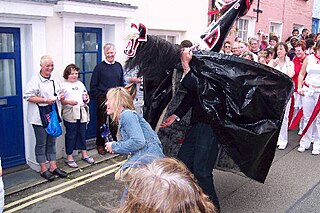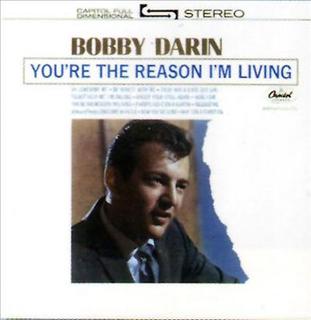Kidsongs is an American children's media franchise that includes Kidsongs Music Video Stories on DVD and video, the Kidsongs TV series, CDs of children's songs, songbooks, sheet music, toys, and a merchandise website. It was created by producer Carol Rosenstein and director Bruce Gowers of Together Again Video Productions (TAVP). The duo had produced and directed over 100 music videos for Warner Bros. Records (WBR) and took their idea of music videos for children to the record label. Warner Brothers funded the first video, "A Day at Old MacDonald's Farm". Shortly thereafter, a three-way partnership formed between TAVP, WBR, and View-Master Video, with TAVP responsible for production and WBR and View-Master responsible for distribution to video and music stores, and toy stores respectively.
"Brigg Fair" is a traditional English folk song sung by the Lincolnshire singer Joseph Taylor. The song, which is named after a historical fair in Brigg, Lincolnshire, was collected and recorded on wax cylinder by the composer and folk song collector Percy Grainger. It is known for its use in classical music, both in a choral arrangement by Grainger and a subsequent set of orchestral variations by Frederick Delius.

Collins & Harlan, the team of American singers Arthur Collins and Byron G. Harlan, formed a popular comic duo between 1903 and 1926. They sang ragtime standards as well as what were known as "coon songs" – music sung by white performers in a black dialect. Their material also employed many other stereotypes of the time including Irishmen and farmers. Rival recording artist Billy Murray nicknamed them "The Half-Ton Duo" as both men were rather overweight. Collins and Harlan produced many number one hits with recordings of minstrel songs such as "My Gal Irene", "I Know Dat I'll be Happy Til I Die", "Who Do You Love?" and "Down Among the Sugarcane". Their song "That Funny Jas Band from Dixieland", recorded November 8, 1916, is among the first recorded uses of the word "jas" which eventually evolved to "jass", and to the current spelling "jazz".

"Low Bridge, Everybody Down" is a folk song credited to Thomas S. Allen, first recorded in 1912, and published by F.B. Haviland Publishing Company in 1913. It was written after the construction of the New York State Barge Canal, which would replace the Erie Canal, was well underway, furthering the change from mule power to engine power, raising the speed of traffic. Also known as "Fifteen Years on the Erie Canal", "Fifteen Miles on the Erie Canal", "Erie Canal Song", "Erie Barge Canal", and "Mule Named Sal", the song memorializes the years from 1825 to 1880 when the mule barges made boomtowns out of Utica, Rome, Syracuse, Rochester, and Buffalo, and transformed New York into the Empire State.
"Streets of Laredo", also known as "The Dying Cowboy", is a famous American cowboy ballad in which a dying ranger tells his story to another cowboy. Members of the Western Writers of America chose it as one of the Top 100 Western songs of all time.
"Sussex by the Sea" is a song written in 1907 by William Ward-Higgs, often considered to be the unofficial county anthem of Sussex. It became well known throughout Sussex and is regularly sung at celebrations throughout the county. It can be heard during many sporting events in the county, during the Sussex bonfire celebrations and it is played by marching bands and Morris dancers across Sussex. It is the adopted song of Brighton & Hove Albion Football Club, Sussex Division Royal Naval Reserve, Sussex Association of Naval Officers and Sussex County Cricket Club.
"Early One Morning" is an English folk song with lyrics first found in publications as far back as 1787. A broadside ballad sheet in the Bodleian Library, Oxford, dated between 1828 and 1829 has the title "The Lamenting Maid" and refers to the lover leaving to become a sailor.
"The Swimmer" is a poem by the Australian poet Adam Lindsay Gordon. The poem is from his last volume of poems Bush Ballads and Galloping Rhymes published in 1870, when he was living at Melbourne. In The Poems of Adam Lindsay Gordon, it is grouped among "Poems Swinburnian in Form and Pessimism, but full of the Personality of Gordon."

The 'Obby 'Oss festival is a folk custom that takes place each 1st of May in Padstow, a coastal town in North Cornwall. It involves two separate processions making their way around the town, each containing an eponymous hobby horse known as the 'Obby 'Oss.
Nottamun Town, also known under other titles such as "Nottingham Fair" and "Fair Nottamon Town" is an American folk song. Although sometimes suggested to be an English song of medieval origin brought to North America during the early colonial era and preserved in oral tradition, and still described as such in some popular works, it is more likely derived from popular 18th and 19th century printed broadsides, with the most likely immediate precursor being the 19th century "Paddy's Ramble to London".
"Widecombe Fair", also called "Tom Pearce", is a Devon folk song about a man called Tom Pearce, whose horse dies after someone borrows it to travel to the fair in Widecombe with his friends. Its chorus ends with a long list of the people travelling to the fair: "Bill Brewer, Jan Stewer, Peter Gurney, Peter Davy, Dan'l Whiddon, Harry Hawke, Old Uncle Tom Cobley and all." Some research suggests that the names originally referred to real people.
Lord Saltoun and Auchanachie, also known as Annachie Gordon, is a Scottish ballad.
"Katie Cruel" is a traditional American folksong, likely of Scottish origin. As a traditional song, it has been recorded by many performers, but the best known recording of the song is by Karen Dalton on the album In My Own Time. The American version of the song is said to date to the Revolutionary War period. The song is Roud no. 1645.
Robin Hood is a comic opera by Reginald De Koven (music), Harry B. Smith (lyrics) and Clement Scott. The story is based on the Robin Hood legend, during the reign of King Richard I. The opera was composed in Chicago, Illinois during the winter of 1888-1889.
The Glendy Burk is an American folk song by Stephen Foster. It appears in James Buckley's New Banjo Book published in 1860. The Glendy Burk of the song is a paddle steamer plying the Mississippi River basin. The boat was named for Glendy Burke: the 29th mayor of New Orleans.

A Folk Song a Day was a project by the English folk singer and musician and Bellowhead member Jon Boden where he recorded and released a folk song each day for one year. The project ended on 24 June 2011.

We Shall Overcome is a 1963 album by Pete Seeger. It was recorded live at his concert at Carnegie Hall, New York City, on June 8, 1963, and was released by Columbia Records.
"There Is a Tavern in the Town" is a traditional folk song, which first appeared in the 1883 edition of William H. Hill's Student Songs. The song was the college anthem of Trinity University College.

You're the Reason I'm Living is a 1963 album by Bobby Darin. It contains Country and Western music, often with a big band twist, and features arrangements by Jimmie Haskell, Shorty Rogers and Gerald Wilson. The title track was a number three hit single. The album reached number 43 on the Billboard 200 chart.







